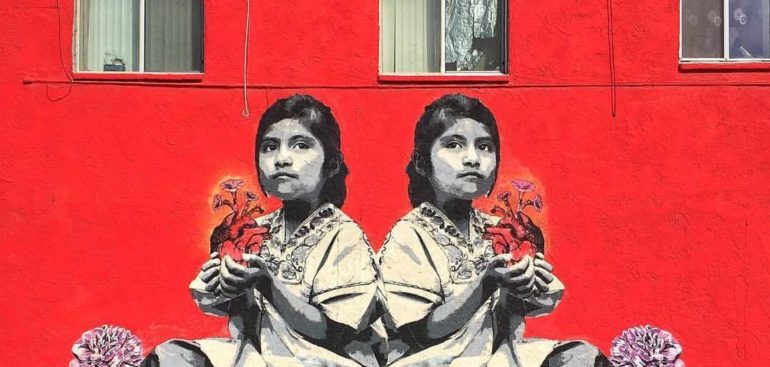By Maria Benavides, Policy Fellow
For Fatima
I waited to get picked up from school. The bell rang and I ran outside to play bebé leche with my friends. We laughed and jumped until their parents escaped the terrible traffic of Mexico City and they had to wave me goodbye. I sat crisscross apple sauce in front of the school gate drawing a kingdom with me as its princess. The beaming sun I drew on the corner of the paper made it the brightest day my empire had ever seen until she cast her shadow over my castle.
Her kind face I already knew, she was our madrina (fairy godmother), the woman who sold us snacks across the street. We called her like that because her freshly cooked kettle chips gave us something to look forward to at the end of each day. Her voice was lower than what I imagined, but it was still nice to put a sound to the idea in my head.
She said she liked my green shirt, that it reminded her of the veils of a willow tree she sings to at midnight near her home.
“I thought willow trees only exist in fairytales and in that one Disney movie, not here,” I said. She told me she lived in the outskirts of the capital, where the open landscapes and the silence allowed the trees to grow. The woman kneeled in front of me and put her mouth next to my ear, even though no one was around us, as if the words she wanted to say were so special she was afraid the air would taint them with its pollution. She then told me an old legend which said if I asked the tree for a wish, it would come true.
“How do you know?” I gasped.
The woman promised it had happened to her once before extending her hand and telling me she would take me to the tree so I could make a wish of my own.
“You really are a madrina!” and so I took her hand. My teacher had warned me about speaking to strangers, but this woman was not a stranger, not to my imagination.
We marched until every corner of the city I had ever known was out of sight, and all that remained was the silence she had described, although the beautiful landscapes and the willow tree was nowhere to be seen. Instead, we stopped in front of the remains of scorched and charred wood.
“Where is tree, madrina?” I asked her, looking up.
She seemed upset. She frowned and pressed her lips together, just like you do whenever I spill chocolate milk on the carpet, mom. Still the way she stared was different. I couldn’t tell you what she felt. Even when you shook your head at the mess I made, your eyes reminded me you love me. Hers, lifeless, pierce my heart as if she’s trying to crush my vessels with her stare.
I let go of her frigid fingers, wanting to run but knowing home was but a faint memory. As the outline of two shadows became more visible behind the woman, I make my wish to the barren and dead wood before me, to see you again.
Four days after Fátima Cecilia Aldriguett Anton was abducted, her body was found inside a trash bag in a bin in the municipality of Tlahuac, near Mexico City. Fátima’s death, along with the hundreds of other femicides in Mexico, has moved the nation and sparked a revolution. Women are standing in solidarity with Fátima’s family and raising their voices in the streets of Mexico, fighting for their right to live without fear.
 My name is Maria Benavides (she/her) and I am a rising junior at Tulane University in New Orleans. I am pursuing a dual degree in international relations and legal studies in business as well as a certificate in gender-based violence. I was born and raised in Monterrey, NL, Mexico but I’ve been living in San Antonio, TX since I was fourteen years old (this is where I’ll be throughout the fellowship!). In my free time I like to watch movies and tennis, make incredibly specific Spotify playlists, read and spend time with my friends. Choosing single favorite book is too hard but my favorites are The Shadow of the Wind and The Harry Potter Series. I also love anything written by Sylvia Plath! My biggest inspirations have always been my parents, my best friends, and Rafael Nadal.
My name is Maria Benavides (she/her) and I am a rising junior at Tulane University in New Orleans. I am pursuing a dual degree in international relations and legal studies in business as well as a certificate in gender-based violence. I was born and raised in Monterrey, NL, Mexico but I’ve been living in San Antonio, TX since I was fourteen years old (this is where I’ll be throughout the fellowship!). In my free time I like to watch movies and tennis, make incredibly specific Spotify playlists, read and spend time with my friends. Choosing single favorite book is too hard but my favorites are The Shadow of the Wind and The Harry Potter Series. I also love anything written by Sylvia Plath! My biggest inspirations have always been my parents, my best friends, and Rafael Nadal.
